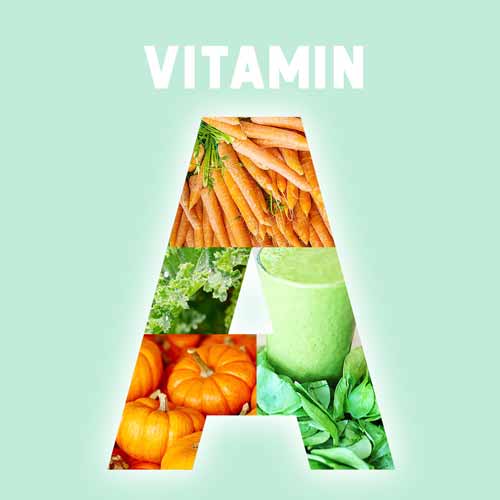
Vitamin A can be defined as a group of unsaturated nutritional compounds. These compounds include retinol (which is an alcohol), retinal (which is an aldehyde), and several carotenoids.
History
In 1912, a biochemist named F. G. Hopkins was able to demonstrate the presence and essentiality of an “unknown factor” other than carbohydrates, proteins, and fats that was required for a rat’s growth. 17 years later, in 1929, he went on to receive a Nobel Prize for this discovery.
In 1913, two other biochemists, McCollum and Davis independently discovered one of these substances at the University of Wisconsin-Madison. They submitted their research paper and received credit for it.
These factors were initially termed as “fat-soluble” around 1918 and two years later, as “vitamin A”.
Around a decade later, a Swiss chemist P. Karrer was able to describe and define the chemical structure of vitamin A.
In 1947, vitamin A was chemically synthesized for the first time by two Dutch chemists – D. A. van Dorp and J. F. Arens.
Importance & Function
Vitamin A is known to support multiple functions – it is required in the processes of growth and development, aids in the maintenance of the immune system, and is known to promote good vision. To find out more details, read on!
- Vision
Vitamin A is essential for good vision. It is needed in the retina of the eye in its aldehydic form – retinal. Retinal combines with a protein, known as opsin, and together they form rhodopsin (also known as visual purple).
Rhodopsin (rod cells and iodopsin – cone cells) is a light-absorbing molecule that aids both night (scotopic) as well as day (colour) vision.
- Immune Function
Vitamin A plays a very important role in the functioning of the immune system. It aids in the proliferation and differentiation of T – cells. It helps the T – cells become sensitive to identify self cells from foreign cells to prevent an auto-immune reaction.
- Hematopoiesis
In the process of stem cell differentiation that takes place in the bone marrow, otherwise known as hematopoiesis, an acidic form of Vitamin A – retinoic acid – is crucial. In the absence of this substance, active stem cells are unable to return to a dormant state and instead, mature into specialized blood cells. This indicates that they are lost as a reservoir.
- Dermatology
Retinoic acid is also known to help maintain good skin health. It does so by switching on certain genes and helping immature skin cells differentiate. It also helps in the reduction of acne as it reduces the size as well as the secretion of sebaceous glands.
Additionally, Vitamin A is essential in Gene Transcription, Reproduction and embryonic development and Bone metabolism.
Sources
SOURCE | % of the adult male recommended daily value per 100 grams |
| Cod Liver Oil | 3333% |
| Turkey Liver | 895% |
| Beef/Pork Liver | 722% |
| Chicken Liver | 366% |
| Ghee (Clarified Butter) | 344% |
| Sweet Potato | 107% |
| Carrot | 93% |
| Broccoli Leaf | 89% |
| Kale | 76% |
| Collard Greens | 64% |
| Butternut Squash | 67% |
| Spinach | 52% |
| Pumpkin | 43% |
| Apricot | 11% |
| Papaya | 6% |
Recommended Daily Allowances for Vitamin A
Note: RDAs (Recommended Dietary Allowance) for vitamin A are given as retinol activity equivalents (RAE) to account for the different bioactivities of retinol and provitamin A carotenoids, all of which are converted by the body into retinol.
Mcg – micrograms
| Age | Male | Female | Pregnancy | Lactation |
| 0–6 months | 400 mcg RAE | 400 mcg RAE | N.A. | N.A |
| 7–12 months | 500 mcg RAE | 500 mcg RAE | N.A | N.A |
| 1–3 years | 300 mcg RAE | 300 mcg RAE | N.A | N.A |
| 4–8 years | 400 mcg RAE | 400 mcg RAE | N.A | N.A |
| 9–13 years | 600 mcg RAE | 600 mcg RAE | N.A | N.A |
| 14–18 years | 900 mcg RAE | 700 mcg RAE | 750 mcg RAE | 1,200 mcg RAE |
| 19–50 years | 900 mcg RAE | 700 mcg RAE | 770 mcg RAE | 1,300 mcg RAE |
| 51+ years | 900 mcg RAE | 700 mcg RAE | N.A | N.A |
Deficiency diseases
Approximately, 33.3% of the children globally are affected by Vitamin A deficiency. This deficiency is also responsible for the death of at least six hundred thousand children every year.
In developing countries, around 300,000 children lose their sight annually due to Vitamin A deficiency – which is known as the “leading cause for preventable blindness during childhood”. Its deficiency is the most prevalent in countries of South Asia and Africa. Additionally, it also increases the risk of death from diarrhoea in children.
Primary Deficiency
This deficiency occurs among children and adults alike. They do not consume an adequate amount of provitamin A carotenoids (found in fruits and vegetables) or preformed Vitamin A from animal or dairy products.
Secondary Deficiency
This kind of deficiency is associated with poor absorption of lipids, improper production and release of bile, and exposure to oxidants such as excessive alcohol or cigarette smoke.
Since Vitamin A is fat-soluble, it is dependent on small globules of fat for its dispersion. This is why those with diets lacking in an adequate amount of healthy fats often report being Vitamin A deficient,
Being deficient in zinc also negatively impairs the absorption, transport, and metabolism of vitamin A because it is essential for the synthesis of the vitamin A transport proteins.
Zinc is also the cofactor in the conversion of retinol to retinal.
The earliest and most specific manifestation of Vitamin A deficiency is low – light or night blindness, and eventually Xerophthalmia.
Another risk of Vitamin A deficiency includes a weakened state of the immune system.
Also, hyperkeratosis (white lumps at hair follicles), keratosis, and squamous metaplasia of the epithelium lining the upper respiratory, and urinary bladder to a keratinized epithelium can occur in vitamin A deficient individuals.
Adequate (but not excessive) supply of vitamin A, is especially important for pregnant and breastfeeding women for normal fetal development and in breastmilk.
If your healthcare professional suspects that you might be deficient in Vitamin A, you would be advised to go for a blood test to confirm the levels of Vitamin A in your body so that proper supplementation or nutritional plan can be advised accordingly. Bhookha Haathi has collaborated with Thyrocare and offers you all such tests and more for the best prices in the market. Moreover, Bhookha Haathi provides customized subscription plans to suit your nutritional requirements that your daily diet might be lacking in to help you lead a healthier life. Find out more on our website!
Written by: Jahnabee Adhikari
Jahnabee is a part-time blogger, full-time dog lover. She believes that writing actually possesses the potential to change the world. She can be often found fantasizing about poetry or buried nose-deep in a Sudha Murthy novel.


